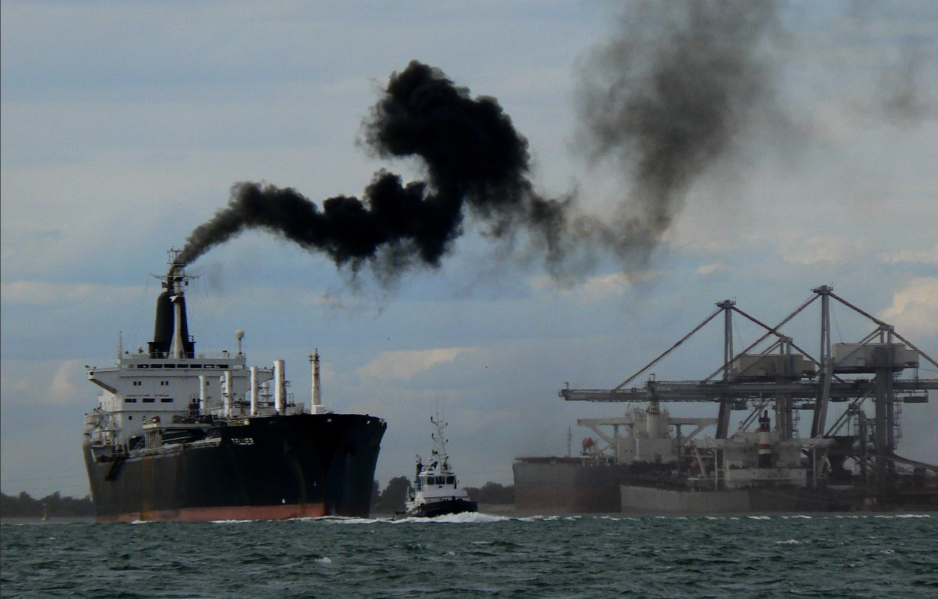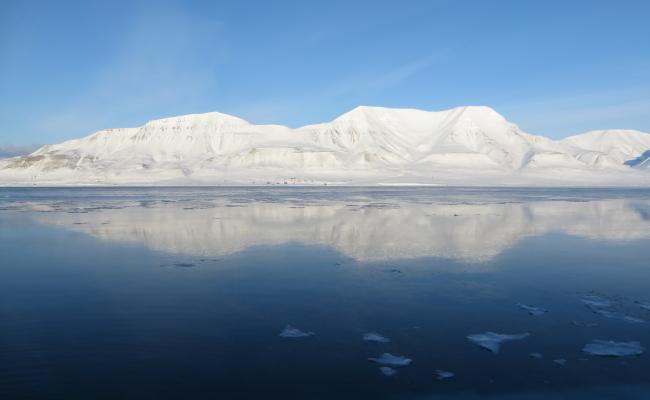Op-ed: How Greenland and Denmark Can Lead the Arctic Council Towards Cleaning up Arctic Shipping

Cargo shipping leaving port with plume of black smoke coming out of its smoke stack. (Source: Roberto Venturini under CC BY 2.0)
As the first round of this Autumn’s Arctic Council meetings kicks off, led by Greenland under the Kingdom of Denmark Chairship, the council must seize the opportunity to set out its priorities for the future health and biodiversity of the Arctic Ocean, the people that depend on it, and global climate systems that it helps regulate, writes Dr. Sian Prior in the Clean Arctic Alliance in this op-ed.
This is an op-ed written by an external contributor. All views expressed are the author's own.
As it takes over chairship of the the intergovernmental forum - established to promote cooperation, coordination and interaction among the Arctic States, Indigenous Peoples and other inhabitants on common Arctic issues - the Kingdom of Denmark's priorities match those proposed by the Clean Arctic Alliance, a coalition of 24 non-profit organisations working to reduce the impact of shipping on the Arctic.
The Arctic is warming four times faster than elsewhere on the planet - with warming of up to 2.5 degrees Celsius already recorded, resulting in a record low winter sea ice this year.
Emissions from international shipping play a significant role in the Arctic’s warming, while new Arctic shipping routes are opening up.
Greenland and Denmark must make this moment count, by ensuring that Arctic governments must push for action within the International Maritime Organization (IMO) for cuts in emissions of greenhouse gases, and in particular short-lived climate super pollutants from shipping, including black carbon and methane.
Black Carbon
Black Carbon is a potent climate and health super pollutant, with a planet-warming potential 1600 times that of an equivalent amount of carbon dioxide on a 20-year warming basis. When this soot-like particulate matter lands on snow and ice, it rapidly accelerates melting and local warming.
Inhalation can lead to severe health impacts, causing heart disease, cancer, and serious lung diseases, contributing to poor health outcomes and increasing premature mortality. However, as it is short-lived, cutting black carbon emissions would have unlock near-immediate climate gains.
Greenland, on behalf of the Kingdom of Denmark, must encourage its fellow Arctic nations to adopt the IMO’s resolution MEPC.342(77), which advocates for shipping to use distillate or cleaner fuels to reduce emissions of black carbon when operating in or near the Arctic, and to lead the development of a ‘polar fuel’ regulation for inclusion in MARPOL Annex VI - the international convention which regulates discharges and emissions from ships - ahead of its PPR 13 meeting in early 2026.
This new mandatory rule should introduce a requirement that only polar fuels - once defined - should be used by ships operating in and near to the Arctic.
The Kingdom of Denmark has the opportunity to convene Arctic states, within the context of the IMO, to encourage them to reduce black carbon emissions in line with 1.5°C warming pathways, the latest science, and Indigenous Knowledge.
This means cutting black carbon emissions from shipping in the range of 75% by 2030 and 95% by 2035 from 2013 levels, across the whole of the Arctic.
Arctic states should support measures to reduce greenhouse gas emissions from shipping in the region.
During the Kingdom of Denmark’s chairship, the Arctic Council should also promote development of a zero-emission vision for Arctic shipping, and support a roadmap to transition from oil-based fuels to cleaner, non-fossil alternatives, along with the necessary onshore infrastructure for supplying these forms of energy.
The current growth in international shipping in the Arctic, both in terms of the number of ships and greater distances being sailed, is leading to increased marine pollution and greater levels of disturbance.
The Council must also ensure a reduction in pollution discharges from ships into the ocean and the risk of oil spills, and take steps to quieten the Arctic Ocean by addressing underwater radiated noise from shipping.
Also read
Arctic Council countries should steer clear of investing in or supporting the use of LNG as a marine fuel because of its lack of life cycle GHG reductions and supply chain methane leaks.
They must also lead the call for prohibition of the use of Exhaust Gas Cleaning Systems - also known as scrubbers which lead to dumping of waste water containing toxic PAHs (Polycyclic Aromatic Hydrocarbons) and heavy metals.
Arctic states should support measures to reduce greenhouse gas emissions from shipping in the region, including speed reductions, installation of wind-assist technology, and increased energy efficiency measures.
Indigenous Rights
As chair, the Kingdom of Denmark must lead the Arctic Council in supporting of the rights of Indigenous Peoples to protect their livelihoods and resources, by reducing black carbon emissions and robustly implementing the IMO’s Arctic heavy fuel oil ban, to protect vital subsistence resources, like fishing and hunting, essential for Arctic Indigenous peoples’ food security and cultural identity.
The Arctic Council should also promote a just and equitable transition that directly benefits Arctic Indigenous communities, by moving towards cleaner alternative non-fossil fuels and increased use of renewable energy such as solar, wind, hydro and battery storage.
Impacts from Shipping
Arctic Council member states should also together encourage the IMO to develop Arctic-specific recommendations and mandatory measures to significantly reduce underwater radiated noise by 2030, due to its impacts on marine mammals and ecosystems, and strengthen regulations on sewage discharges, developing Arctic-wide regulations on greywater discharge.
Establishing green shipping corridors with biodiversity, pollution and climate goals which include vessel routing, speed reductions, and designation of shipping-free zones can reduce shipping’s impact on priority Arctic ecosystems and wildlife.
Finally, Arctic Council member states must ensure that the Arctic Council becomes stronger. It can do this by strengthening cooperation among Arctic nations to collaboratively respond to shipping accidents, including oil and chemical spills, while recognizing and addressing the lack of trained emergency responders and equipment for search, rescue, and oil spill response in the region.
The Kingdom of Denmark has a critical role to play shaping the Arctic’s future under its leadership of the Arctic Council and doubly so while Denmark holds the Presidency of the European Union.
The Clean Arctic Alliance welcomes the opportunity to work alongside the Kingdom of Denmark and members of the Arctic Council to take action that will halt and reverse the impacts of the climate crisis in the Arctic, while promoting sustainable opportunities for the people who call the Arctic region home.




